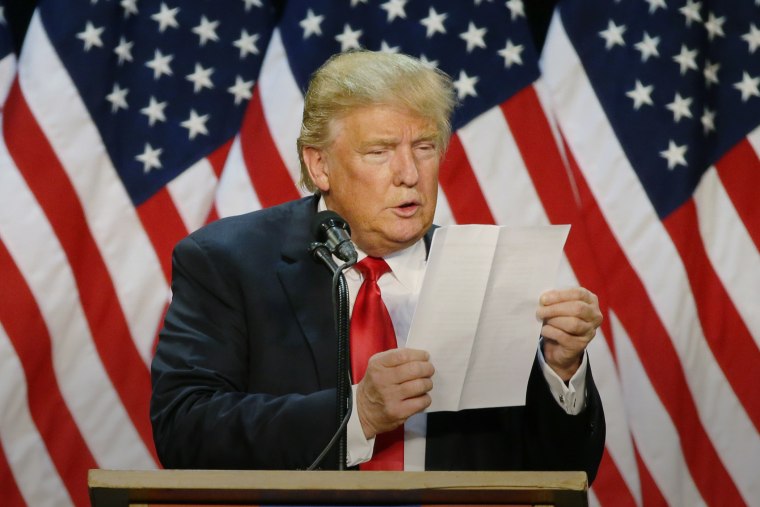The Associated Press had an interesting report last week just how little work Donald Trump and his team have done when it comes to "the nitty gritty of outlining what he would do as president."
From the start, Trump has never been the kind of candidate to pore over thick policy books. Indeed, he has mocked Clinton on the subject. "She's got people that sit in cubicles writing policy all day. Nothing's ever going to happen. It's just a waste of paper," he told Time Magazine in June. "My voters don't care and the public doesn't care. They know you're going to do a good job once you're there." To date, Trump's campaign has posted just seven policy proposals on his website. There are 38 on Clinton's site, ranging from efforts to cure Alzheimer's disease to Wall Street and criminal justice reform.
It led CNN's Brian Stelter to flag an interesting detail over the weekend that I hadn't seen elsewhere: "Trump's site has 9,000 words of policy proposals. Clinton's site: 112,735 words."
Clinton herself is certainly aware of the discrepancy, recently telling voters, "I've laid out the best I could, the specific plans and ideas that I want to pursue as your president because I have this old-fashioned idea. When you run for president, you ought to tell people what you want to do as their president."
According to her Republican rival, this is an antiquated model to be avoided.
MSNBC's Chris Hayes had a series of tweets on this earlier today, and it's worth checking them out. Chris noted, for example, that Politico ran a fairly routine profile on Clinton's tech policy advisers, which stood out largely because there is no comparable group on Team Trump, which has made a deliberate decision not to build any intellectual infrastructure.
"[U]ltimately a Trump Presidency is a complete and total black box," Chris concluded. "No one, probably not even Trump, knows what the hell it looks like."
It's an under-appreciated point. Trump and his aides considered providing voters with more detailed information about how the candidate would govern, but they rejected it. In May, Politico quoted a campaign source saying Trump didn't want to "waste time on policy," in part because he believes "it would make him less effective on the stump."
The same source added at the time, "It won't be until after he is elected but before he's inaugurated that he will figure out exactly what he is going to do."
As we discussed at the time, this posture turns the whole point of campaigns on its head. Voters are apparently supposed to support the least-experienced, least-prepared presidential candidate of the modern era first, and then he’ll let the public know how he intends to govern.
Regular readers know I’ve been banging the "post-policy" drum for a few years now, but Trump’s “vote now, details later” posture is a terrific encapsulation of the larger problem. In 2016, the Republican Party's new norms treat substance and policy details as an annoyance to be avoided.
